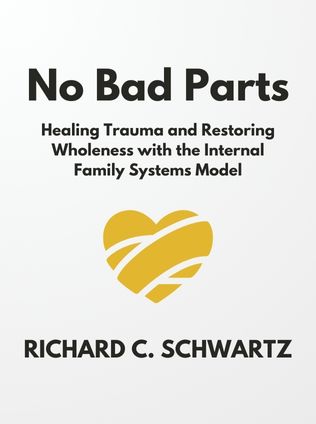
No Bad Parts
Healing Trauma and Restoring Wholeness with the Internal Family Systems Model
By Richard C. Schwartz
Published 07/2021
About the Author
Dr. Richard Schwartz is a distinguished figure in the world of psychotherapy, celebrated for his groundbreaking work in developing Internal Family Systems (IFS) therapy. He began his professional journey as a marriage and family therapist, where he became deeply interested in the dynamics of relationships within families. His academic career saw him teaching at the University of Illinois at Chicago and working at The Family Institute at Northwestern University. It was during this time that Schwartz began to notice a pattern among his clients—they often spoke about internal parts of themselves in conflict, a phenomenon that sparked his curiosity and led to the birth of IFS.
Schwartz’s innovative thinking led him to apply family systems theory, traditionally used to understand interpersonal dynamics within families, to the intrapersonal realm of the mind. His work has since gained widespread recognition, not just as a novel approach, but as an effective and transformative method for personal healing. Over the years, Schwartz has authored numerous books, each contributing to the development and refinement of IFS. His book "No Bad Parts" is one of the most accessible and insightful works, offering a deep dive into the intricacies of IFS. Today, Schwartz continues to lead the IFS Institute, an organization dedicated to training therapists and spreading the principles of IFS worldwide. His work has transformed countless lives, offering a path to healing that honors the complexity and multiplicity of the human psyche.
Main Idea
"No Bad Parts" is a profound exploration of the human psyche, presenting a revolutionary approach to understanding the self. At the heart of the book is the concept of multiplicity—the idea that each of us is composed of multiple internal parts, each with its own distinct personality, motives, and memories. Dr. Richard Schwartz challenges the traditional notion of a singular, unified mind, proposing instead that our internal world is more like a family, with various parts that can sometimes be in conflict with each other.
Schwartz introduces the concept of the Self, which he describes as the core of our being—a wise, compassionate, and patient leader that has the capacity to guide and heal our internal parts. The book delves into the dynamics of these internal parts, categorizing them into protectors and exiles, and offers practical strategies for healing and harmonizing these parts through the process of unblending and unburdening. Ultimately, "No Bad Parts" is a guide to achieving Self-leadership, a state in which the Self takes the lead in our internal system, allowing us to live with greater clarity, compassion, and connection to others.
Table of Contents
- Introduction to Internal Family Systems
- The Self: The Core of Your Being
- Multiplicity: Understanding Your Inner Parts
- Protectors and Exiles: The Roles Within
- Unblending: Accessing the Self
- Unburdening: Healing the Wounded Parts
- The Implications of Self-Leadership
Introduction to Internal Family Systems
Internal Family Systems (IFS) therapy represents a significant departure from traditional therapeutic models, which often view the mind as a singular entity. Dr. Richard Schwartz’s IFS posits that the mind is composed of multiple parts, each functioning like a subpersonality with its own thoughts, feelings, and motivations. These parts interact with each other much like members of a family, sometimes harmoniously and sometimes in conflict.
The core idea of IFS is that everyone has a "Self," which is the central, unblemished core of our being. The Self is inherently compassionate, curious, and wise, capable of leading our internal family of parts toward healing and harmony. The various parts within us can become burdened by past traumas and negative experiences, leading to dysfunctional behaviors and emotional distress. The goal of IFS therapy is to help these parts unburden themselves, allowing the Self to take its rightful place as the leader of our internal system.
Schwartz’s approach is both compassionate and non-pathologizing. He rejects the idea that any part of us is inherently bad or needs to be eliminated. Instead, he emphasizes that all parts are valuable and have positive intentions, even if their methods of trying to protect us are counterproductive. By recognizing and understanding the roles these parts play, we can begin to heal the internal conflicts that drive much of our suffering.
Multiplicity: Understanding Your Inner Parts
The concept of multiplicity is at the heart of IFS. Dr. Richard Schwartz proposes that we are not singular beings with a unified mind, but rather, we are composed of multiple internal parts. These parts are subpersonalities, each with its own thoughts, feelings, and motivations. This idea stands in stark contrast to the traditional "mono-mind" model, which assumes that all thoughts and emotions come from a single, unified self.
Sign up for FREE and get access to 1,400+ books summaries.
You May Also Like
The Subtle Art of Not Giving a F*ck
A Counterintuitive Approach to Living a Good Life
By Mark MansonRich Dad Poor Dad
What the Rich Teach Their Kids About Money - That the Poor and Middle Class Do Not!
By Robert T. KiyosakiHow To Win Friends and Influence People
The All-Time Classic Manual Of People Skills
By Dale CarnegieFreakonomics
A Rogue Economist Explores the Hidden Side of Everything
By Steven D. Levitt and Stephen J. Dubner



















